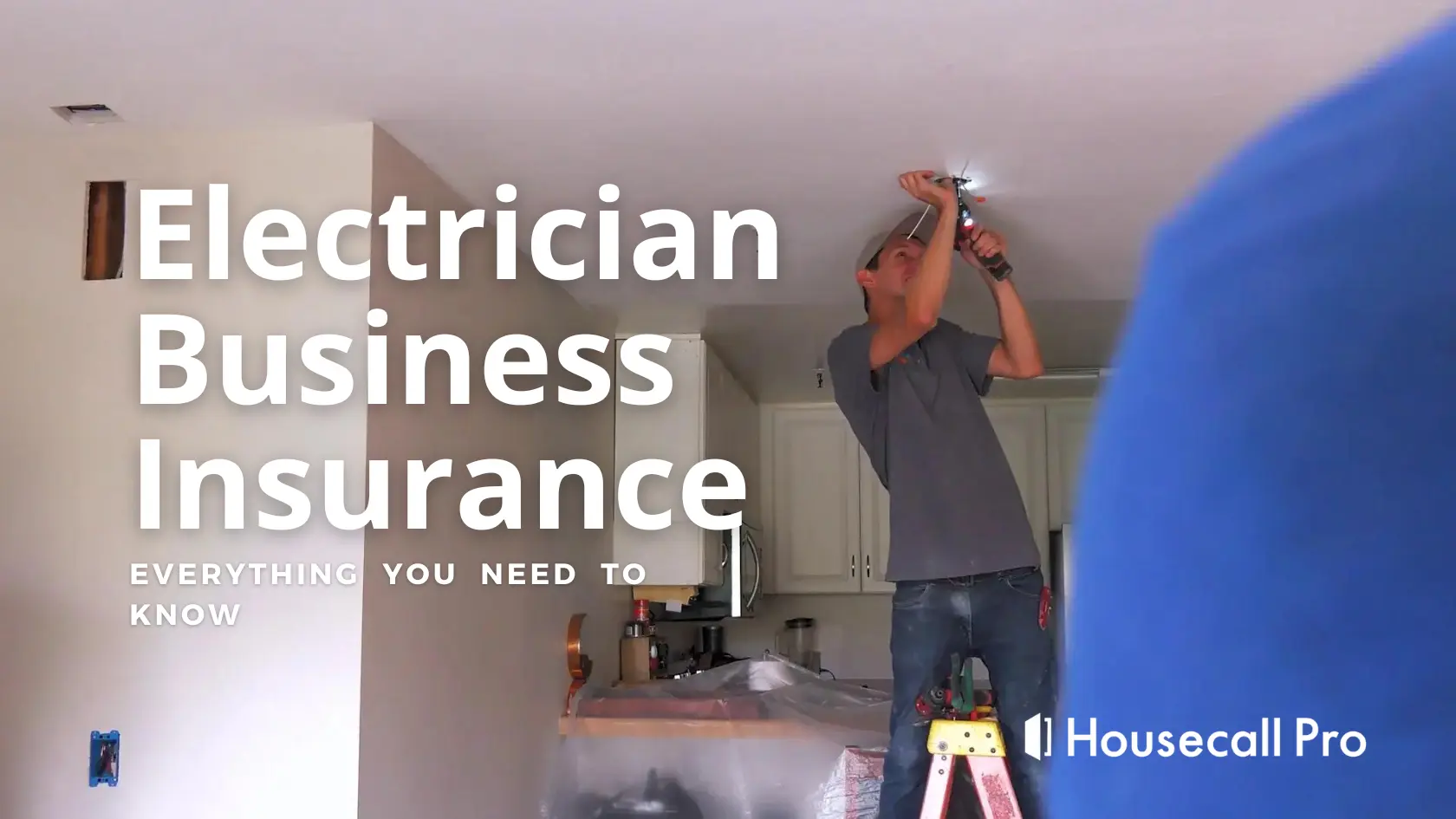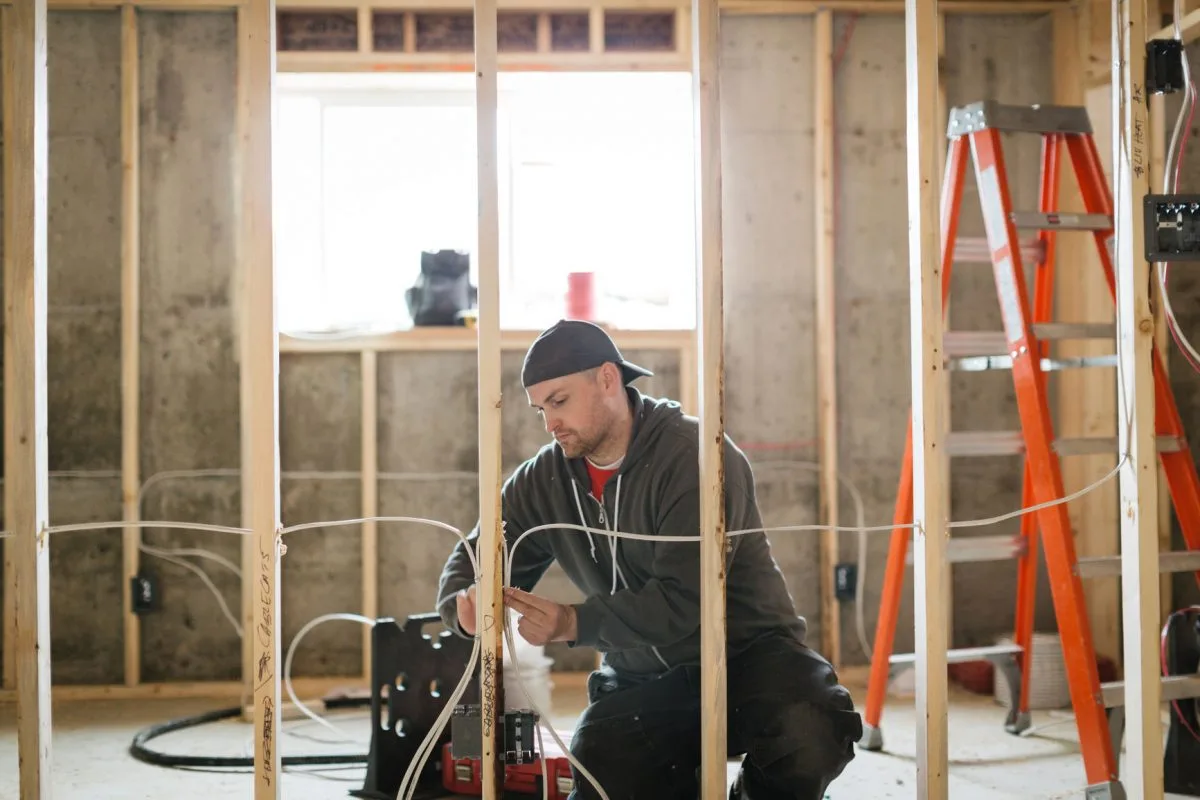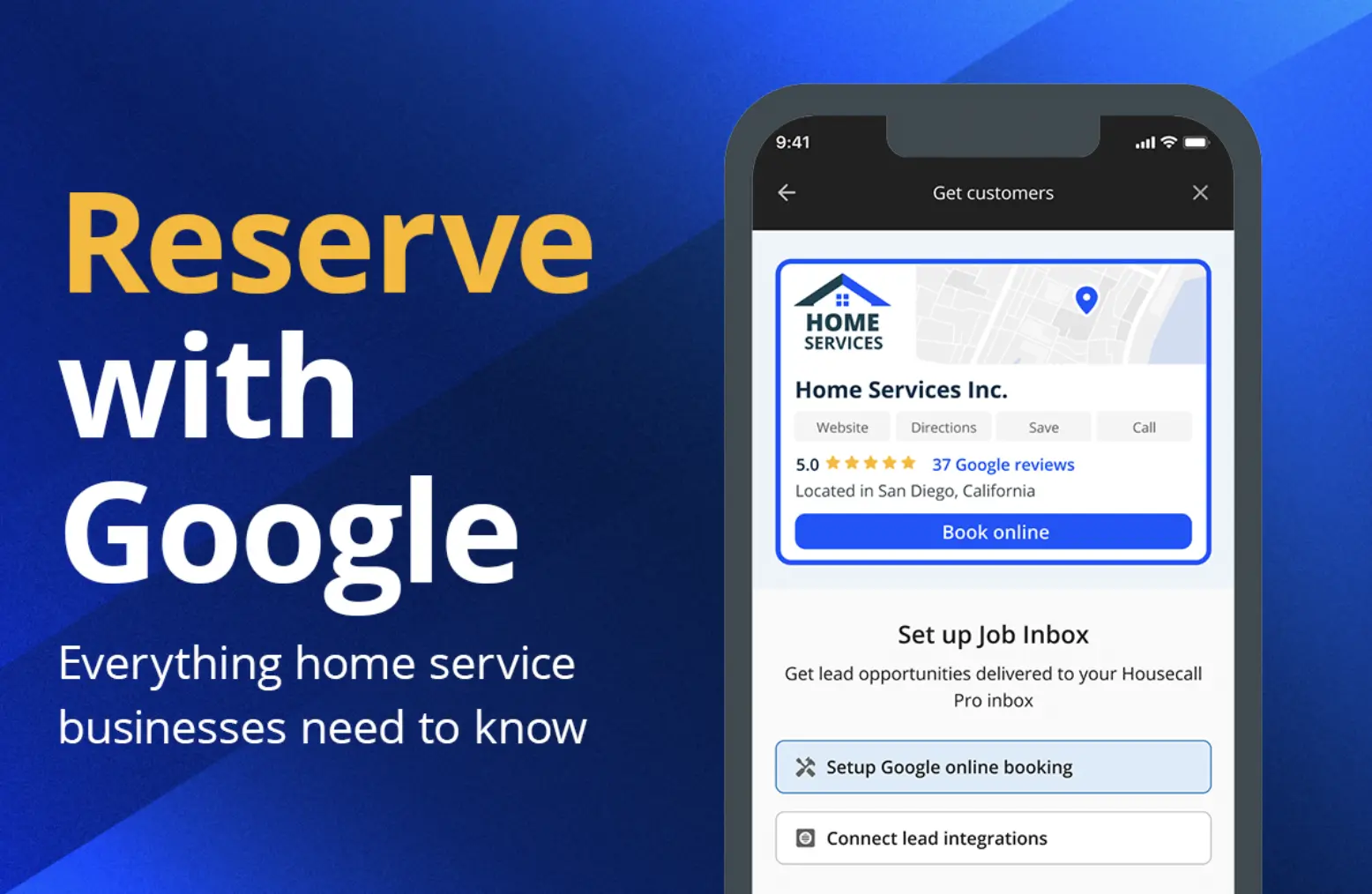
One of the best inventions of all time, hands down, has been electricity. And it’s needed pretty much everywhere. But working in the electricity space doesn’t come without its share of risks. Hazards include the risk of electrocution, slip and fall risks, and even motor vehicles that may not see you when you’re at work.
But there are other risks for electricians, too. While you may do a fantastic job every day, sometimes things happen. Electrical shorts occur, people are left without power, and so much more. When this happens, electrical contractors can be held liable. That’s why insurance is so important. But just what type of electrician insurance is needed? We’ve got the answers to make sure you’re covered—literally.
Here’s What You Need To Know About Electrician Insurance
What Insurance Coverages Do Electrical Contractors Need?
The world of insurance can be confusing. It’s super important to understand that you may need multiple policies depending on your work type. That’s why we’ve put together this overview to help you understand the best electrician insurance to protect you and your electrical contracting business.
General Liability Insurance
The first type of insurance to understand is general liability coverage. This policy covers you and your company for claims related to property damage related to your electrical contractor services and operations. It also protects you and your company from bodily injury claims.
However, even if unintentional, a general liability policy does not cover automobile accidents, workplace injuries, workmanship, punitive damages, or professional mistakes.
Commercial Property Insurance
Commercial property insurance is designed to cover your commercial property. For electrical contractors, this includes your office building or any outbuildings used to store supplies. Commercial policies are intended to cover your property for catastrophes such as fire, natural disaster, or theft.
Your insurance agent may be able to bundle this insurance with your general liability insurance.
Business Interruption Insurance
Just as it sounds, business interruption insurance is designed to cover you if you cannot provide your electrical contractor services. For example, if a natural disaster occurs and a tree falls on your work vehicle and you can’t access your customers, the policy will cover the costs of loss of income until you can get back to work.
You can often get a Business Owner’s Policy (BOP) bundle that provides business interruption insurance as part of your commercial property and general liability insurance.
Worker’s Compensation Insurance
In most states, electrical contractors must carry workers’ compensation insurance if they have even just one employee. In some states, you might be required to carry this type of insurance if you are the sole proprietor and only employee.
Workers compensation insurance covers you or your employees if an accident occurs while working and renders you unable to work. You may also get coverage to protect you from lawsuits should a legal situation arise.
It’s important to know that many general contractors will require that you provide proof of workers comp insurance before they will hire you for a job.
Business Owner’s Policy
We briefly mentioned the Business Owner’s Policy (BOP) above. The purpose of a BOP is to make everything easier for you as an electrical contractor. Having various separate policies can be confusing and may leave you wondering if you have enough coverage. A business owners policy ties together your business property and business liability insurance into one insurance policy.
BOP insurance also covers your electrical business from claims due to uncontrollable events such as fire, theft, or other covered disasters. It also helps cover claims that could come up from your business operations, such as bodily injury or property damage.
Errors and Omissions Insurance
As an electrical contractor, you take your job very seriously. You participate in hours, weeks, and years of training to perfect your craft. However, mistakes happen. And when they do, you need to ensure that you are covered.
Errors and omissions insurance (E&O) is professional liability insurance that protects you and your workers against claims your clients may bring against you for inadequate work or negligent actions.
Equipment Breakdown Insurance
You need a lot of tools to do your job. While you might not require bulldozers or tractors, you need various tools to install electrical wiring, power grids, and more. You likely need tools such as drills and impact drivers, hammer drills and rotary hammers, and saws. You’ll also need commercial-grade meters and testing tools, including multimeters, voltage testers, circuit finders, and insulation resistance testers.
If those tools break down, you might not be able to do your job. Further, much of that equipment can be quite costly. Equipment breakdown insurance covers damages to tools and pieces of equipment related to mechanical breakdowns, power surges, motor burnout, and even operator error.
Commercial Auto Insurance
Electrical contractors require vehicles to get them from job to job and site to site. So, as it sounds, commercial auto insurance is designed to cover the trucks, vans, and cars used in conducting your business. No matter your business size, you should have a commercial auto insurance policy.
What Does Electrician Business Insurance Cover?
So, what does electrician business insurance cover? Well, it really depends. As you can see from the list above, multiple policies cover certain aspects of your business. It’s important to do your homework and speak clearly with your insurance agent to ensure you understand what you are getting when purchasing a policy. You may inadvertently buy a policy, thinking you are covered for everything, only to find out you don’t have coverage for errors and omissions or your work vehicle.
So, to recap and summarize what we shared above, the various electrician business insurance policies cover the following:
- General Liability Insurance: Protects against damages or injuries your business might cause to other people or their property.
- Commercial Property Insurance: Covers damage to your own property, like your office or storage, from disasters or theft.
- Business Interruption Insurance: Helps cover lost income if you can’t work due to events like natural disasters.
- Worker’s Compensation Insurance: Pays for medical costs and lost wages if you or an employee gets hurt on the job.
- Business Owner’s Policy (BOP): A package that combines property and liability insurance for broader coverage.
- Errors and Omissions Insurance (E&O): Covers claims against you for mistakes or negligence in your work.
- Equipment Breakdown Insurance: Pays for fixing or replacing your tools and equipment if they break down.
- Commercial Auto Insurance: Covers damages and liability for business vehicles used for work purposes.
What’s Not Covered by Electrician Insurance?
You may look at that list above and think if you have all those policies, you’re covered for anything and everything. But that’s not the case. There are some things that you won’t be covered for.
Here is a list of what is excluded by electrician insurance:
- Floods: A distinct flood insurance policy is necessary for coverage.
- Government Actions: Confiscations or seizures by authorities are not covered.
- Infectious Diseases: Exclusions typically apply to pandemics and infectious diseases.
- Intentional Misconduct: Acts of fraud or intentional wrongdoing are not included.
- Nuclear Fallout: Radioactive contamination and fallout are not covered.
- Termination Disputes: Wrongful termination claims require employment practices liability insurance for coverage.
- War: Incidents related to war or armed conflicts are excluded.
- Earthquakes: Separate earthquake insurance policies must be purchased for coverage.
Get In Touch: 858-842-5746
Let us earn your trust
See plan options and feature breakdown on our pricing page.
Top Insurance Providers for Electrical Contractors
Deciding which insurance provider to work with is not something to take lightly. You need to research not only the provider but also any agent that you might work with. If something doesn’t feel right, it probably isn’t.
This isn’t to say that smaller insurance providers aren’t great partners. They may have precisely what you are looking for and can offer that personal touch you expect when buying insurance. You may also be able to find a local broker that represents a variety of insurance providers. They can work with the various underwriters to create the best policy to serve you and the nuances of your business.
This all said, when it comes to the top insurance providers for electrical contractors, these organizations tend to rise to the top.
1. The Hartford
The Hartford has been around since 1810, making it one of the oldest insurance companies. Its headquarters are in Hartford, Connecticut. Known for offering a wide range of insurance products, The Hartford is well-known and underwrites thousands of business policies.
They’re especially strong in understanding the unique needs of electrical contractors. According to their website, they have a customer rating of 4.8 out of 5 for business insurance.
2. Nationwide
Nationwide was founded in 1926 and is based in Columbus, Ohio. This company is well-known for its slogan, “Nationwide is on your side,” which speaks to its commitment to customer service and support. Nationwide offers a variety of insurance policies suitable for electrical contractors, including general liability and commercial auto insurance. They’re praised for their straightforward claim process and the ability to bundle different types of insurance for more savings.
3. Travelers
Founded in 1853 and headquartered in New York City, Travelers is one of the largest insurance companies in the United States. It provides many insurance options tailored to businesses’ needs, including specific electrician policies. Travelers is respected for its strong financial foundation and history of dependable coverage.
4. Next Insurance
Next Insurance is a newer player in the industry, founded in 2016, with headquarters in Palo Alto, California. Despite its relatively short history, Next has significantly impacted by focusing on digital-first insurance solutions, making it easy for electrical contractors to get insured online quickly.
However, perhaps more important is their dedication to working with small business owners. A quick visit to their website will show you options for general liability, workers’ compensation, professional liability, business owner’s policies, and more. They offer customized insurance policies that are flexible and affordable. However, Trustpilot reviews suggest you should clearly read the fine print to understand your coverage.
5. Hiscox
Hiscox, established in 1901, is based in Bermuda but operates globally, offering insurance services in various countries. For electrical contractors in the U.S., Hiscox provides specialized policies that address the industry’s unique challenges for small business owners.
Hiscox offers both general and professional liability insurance that can be tailored to each contractor’s specific needs. They have a Trustpilot score of 4.6 (excellent).
How Much Does Electrical Insurance Cost?
Getting electrical insurance needs to be viewed as a cost of doing business. The great news is that, in most cases, the expense is considered a tax deduction by the Internal Revenue Service (IRS). With all this said, how much does electrical insurance cost?
It’s important to remember that the amount you pay will vary based on the type of policy you get, the number of employees you have, where your business operates, and even the types of electrical contracting services you provide. However, electrical contractor insurance is generally considered affordable, with general liability insurance costing roughly $48 per month.
Workers compensation insurance costs about $81 per month for businesses with a payroll of under $300,000 annually. Commercial auto insurance costs can vary greatly depending on the type of vehicle(s), number of drivers, etc. However, you can anticipate somewhere between $101 and $150. As a hint, consider fleet tracking devices, which can decrease insurance premiums.
Your tools and equipment policy can also vary based on the quantity and quality of tools you have. The costs, however, are estimated at around $35 per month.
Insurance for Electricians Example Costs
Here is a quick grid to help you estimate the monthly costs of the best electrician insurance policies.
| General Liability Insurance | $48.00 |
| Commercial Property Insurance | $67.00 |
| Business Interruption Insurance | $90.00 |
| Workers Compensation Insurance | $81.00 |
| Business Owner’s Policy (BOP)* | $83.00 |
| Errors and Omissions Insurance (E&O) | $42 per employee |
| Equipment Breakdown Insurance | $4 |
| Commercial Auto Insurance | $125 |
| ESTIMATED TOTAL | $540 |
*Though we provided an estimated monthly total of $540, please remember that your BOP will likely combine your property and business liability insurance into one policy.
Mistakes To Avoid When Selecting Business Insurance
If you’re not in the insurance business, it can feel quite overwhelming to determine the right insurance for your business. However, we have a couple of tips to help you avoid making a mistake and looking back sometime in the future, wishing you had made a different decision.
Neglecting to Work With Licensed Insurance Agents
One common mistake to avoid is failing to work with licensed insurance agents who specialize in the unique needs of your industry. Licensed insurance agents bring expertise and industry knowledge to the table, ensuring that you understand your coverage options thoroughly. They can assess your business’s specific risks and recommend tailored insurance solutions that provide adequate protection.
Moreover, licensed insurance agents have access to a wide range of insurance products from reputable insurers. They can help you compare quotes, negotiate terms, and find cost-effective solutions that fit your budget without compromising on coverage quality.
Overlooking Types of Coverage
As you chat with your insurance agent, discuss all types of insurance coverage available to you. Adopt a growth mindset for those conversations, thinking not just about where your business has been, but where it is going. Just because you’ve never had a problem or received a complaint doesn’t mean that you won’t in the future. And as your business grows, your risks increase.
Neglecting to Review Exclusions and Limitations
Always review the fine print. Understand what is excluded or where there are limitations in each policy. Ask your agent about where you might be able to get additional coverage to offset those gaps. Remember, you are responsible for understanding the terms and conditions of any policy you sign. So, read the fine print carefully and know what you are signing up for.
Promoting Safety With Electrical Contractor Software
At Housecall Pro, we’re all about safety and providing electrical contractors with software to help them do their jobs better. This includes job checklists, fleet management, and live chat communication, which can help electrical contractors ensure their technicians follow proper safety protocols and comply with relevant regulations.
Taking a proactive approach to safety can help prevent accidents and injuries. The result? Safer employees and lower workers’ compensation and liability insurance costs for your business.






